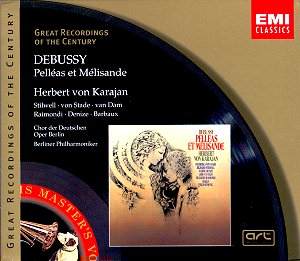Although apparently a "difficult", elusive
work, Debussyís intentions and his own realisation of them in music
are so crystal clear that Pelléas et Mélisande
has had a long and distinguished discography from the Désormière
of 1941 through Ansermet and Cluytens down to Dutoit and others of recent
vintage with scarcely a dud one along the way. By and large the work
has remained in the hands of French interpreters or non-French who have
made a particular speciality of French music, and recordings have remained
in the tradition of that first Désormière performance,
most of whose interpreters had roots going back to Debussy himself.
Two recordings remain outside tradition and can be compared only to
themselves. One, oddly enough, is conducted by a Frenchman, the ultra-modernist
Pierre Boulez; the other is the present set under Karajan.
In Karajanís vast but rather selective repertoire a
small core of Debussyís works, principally La Mer and Prélude
à líaprès-midi díun faune, remained at the heart of
his affections and he returned to them again and again. He conducted
notable performances of Pelléas at La Scala in 1954 and
the Vienna State Opera in 1962, but this was his only recording of it.
While it is true that you will not find here the fruity tones of
the typical French woodwind, it is also true that Debussyís orchestral
writing can only gain from a conductor whose control over the sonorities
and the phrasing of his orchestra was on a level of mastery with that
which Gieseking and Michelangeli could obtain from their pianos. Instruments
waft in and out in a kaleidoscopic display in which perfection of ensemble
and perfection of balance are never made an end in themselves, for Karajanís
sense of the overall shape of the work, the long line, is unerring.
And let it not be thought that he swamps the piece in Wagnerian sonority,
for the bass-line is always light, the sound properly luminous and with
a real French mobility to the phrasing Ė he never lets things stagnate.
While the colours are predominantly sombre, he is acutely sensitive
to the occasional shafts of light that enter into Maeterlinckís shadowy
world, such as when Arkel hopes that now "un peu de joie et un
peu de soleil" will enter the castle; he also obtains playing of
searing passion in the interlude following Golaudís fearful outburst
"Une grande innocence", and his conducting of the opening
of Act V and its closing pages evinces his deep love of the music. Though
it is an unusual Pelléas, I did not find that Karajan
came between me and the composer at all.
The soft, crooning style of singing insisted upon by
Karajan in the more conversational passages (80% of the opera) places
a strain on the singers, but they all cope beautifully. It is indeed
strange to hear one of the richest-toned Verdian basses of his time
singing sotto voce, but Raimondi proves an inspired choice as
Arkel, his tone acquiring real beauty in the more melodic phrases and
tremendous power on the few occasions when it is needed. Van Damís Arkel
is also a remarkable assumption, from the bewildered beginning to his
increasingly sinister, brooding presence (mirrored by the harsher timbres
Karajan draws from the orchestra). His account of the "Une grande
innocence" scene is terrifying and he shows much psychological
understanding of Golaudís clumsy, barely comprehending attempts at rapprochement
with dying Mélisande.
Richard Stilwell is occasionally husky in his earlier
scenes but finds much beauty of tone as his love for Mélisande
develops. Von Stade remains elusive, alternating straight, girlish tones
with a sometimes heavy vibrato, and finding a degree of focus towards
the end. But I think this is part of Karajanís intentions, since Mélisande
is herself so elusive, mysterious. Who she is and where she comes from
is never really clear. This performance points up strongly the way in
which Pelléasís more ardent declaration of love fails to elicit
more than an almost disembodied response, a gently whispered "Je
tíaime aussi". She replies to Pelléasís longer outbursts
with brief phrases and, when he says she is looking somewhere else she
replies that she was seeing him somewhere else. Maeterlinckís world
is full of shadowy symbols, but I would suggest that in a certain sense
she doesnít exist at all, except as a reflection of what three lonely
men (and a lonely child) living in a dark isolated castle felt they
needed. Von Stadeís selflessness in accepting to sing an entire opera
without once putting her voice on display is rewarded by the fact that
she becomes the still centre of the opera even as Golaud is its dramatic
centre.
When a recording is issued in a series called "Great
Recordings of the Century", one is bound to ask, "is
it one of the great recordings?" For many of the generation that
grew up in a musical world dominated by Herbert von Karajan, the image
of the chromium-plated maestro producing ever more glossy re-recordings
of the standard repertoire proved eminently resistible. Strangely enough,
it was often his one-offs that revealed his greatness. Almost more than
any other recording of his that I know, this Pelléas is
one that I feel can be produced as evidence that (and the admission
almost sticks in my throat) he truly was a very great musician indeed.
There is a full libretto, a synopsis and a useful note
by Richard Osborne, all in English, French and German, and the sound
quality is everything you could wish for.
Christopher Howell
